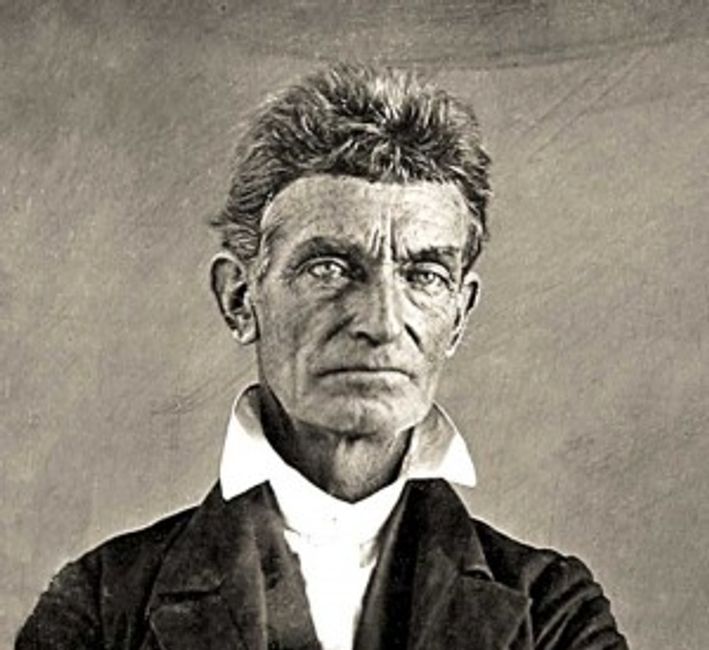
Why Care About John Brown & the Abolitionists of Richfield
In these first decades of the 21st Century, our nation seems a fractured and divided country. Many of us seem to be separating into groups angry at one another with little in common, across a divide of race. ….But the American experience would show it need not always be that way.
With the establishment of the American Republic the old system of the British importation of slaves, out of supposed economic necessity and enforced labor, was hotly debated. Many wanted this hateful practice to end. But unfortunately, there were others who said they would only join in the struggle for American freedom from British Imperial Rule if slavery was allowed to continue. And so the greatest experiment in human freedom ever founded on Earth began under the compromise of freedom for the many and bondage and chains for others. As vile and horrific as it was, it was the only way to be able to throw off British rule.
This terrible compromise would continue to haunt our nation for another 80 years. The churches of the North stated slavery was a sin. Intellectuals, writers and poets condemned it. Once slave, now free men and women, lectured against it. Political parties and great social movements made it their goal to end it. Then finally, small town Caucasian Protestant farmers across America said, "Enough is Enough!".
These individuals took it upon themselves to do something. These men and women of European descent, at great personal risk, created a way to spirit escaping freedom seekers away from those who would be their masters. They created the Underground Railroad.
They had no need to. They did not have personal cause in this struggle. It was not their business. But they did it anyway. They defied the unjust laws mandating free and slave states. They refused to obey The Fugitive Slave Act. They shouldered the real possibility of physical harm and even death for helping those so different from themselves. They did it because most Americans, in spite of the occasional compromises we must make, truly do believe in freedom and equality for all. It sometimes takes a long time to overcome custom, habit, or supposed need, but in the end our American Republic has always found a way to guarantee liberty and justice for all.
This is the lesson that Richfield, Ohio can help our nation to remember. The citizens of Richfield, through their church and as individuals and friends, made their community a major stop on Freedom's Highway. The Oviatt's, Ellsworth's, Bigelow's, Palmer's, Farnum's, Wheatly's and Browns and so many others, built false bottoms into their wagons so they could smuggle their precious cargoes. They constructed hiding places in their homes and barns. They added concealed basements to their houses. They worked tirelessly to bring escaped "property" to freedom. They spent endless days traveling the mud roads to deliver the escaped to the next stops. They risked injury, even death, so all souls could be free.
No one knows the full extent of how John Brown affected the community of Richfield when he lived here. Nor do we know how Richfield affected him. But if you look at the historical record and the writings of the time, it is clear there were Abolitionists in Richfield before his arrival, and they were here long after he left. John Brown arrived in Richfield just a few years after he declared himself an Abolitionist. He came to run a tannery, and to herd sheep for the Farnum Estate. But once he became a resident, we know he borrowed a false bottom wagon from his friend, Mason Oviatt, so he too could help to free the once enslaved. He was here just a relatively short while, but the effect on him and his chosen community was most certainly profound.
The lesson that Richfield can teach so many others is that it is fundamentally in our nature to seek, and sacrifice for, equality for all. By recognizing John Brown and the years he spent living in Richfield, and all the other Abolitionists of Richfield, we can say to all Americans it is good to remember to what extent we will strive for Liberty for each and every one of us. It is important to remember John Brown and the houses where he lived, to visit the farms where he worked, the tannery where he labored, the Stagecoach stop he used and the graveyard where his children are buried. They should all be preserved for future generations. But witnessing the door knobs he touched and the ground his children consecrate, is not to really know the greatness of the man and of the others he worked with, led and learned from. It is all the actions and efforts of so many Richfield residents and of John Brown himself that informs us of the particulars of the greatness of America.
This is why remembering John Brown and all those other Abolitionists is to remember just how great America has always been. That despite all of our sometime faults and history, it is good to remember that at our core, we may be the most loving, willing to sacrifice and generous people to have ever gathered on Earth. It is a lesson our community, and our wonderous America, has to teach so many others.
Copyright © Jim Fry 2018